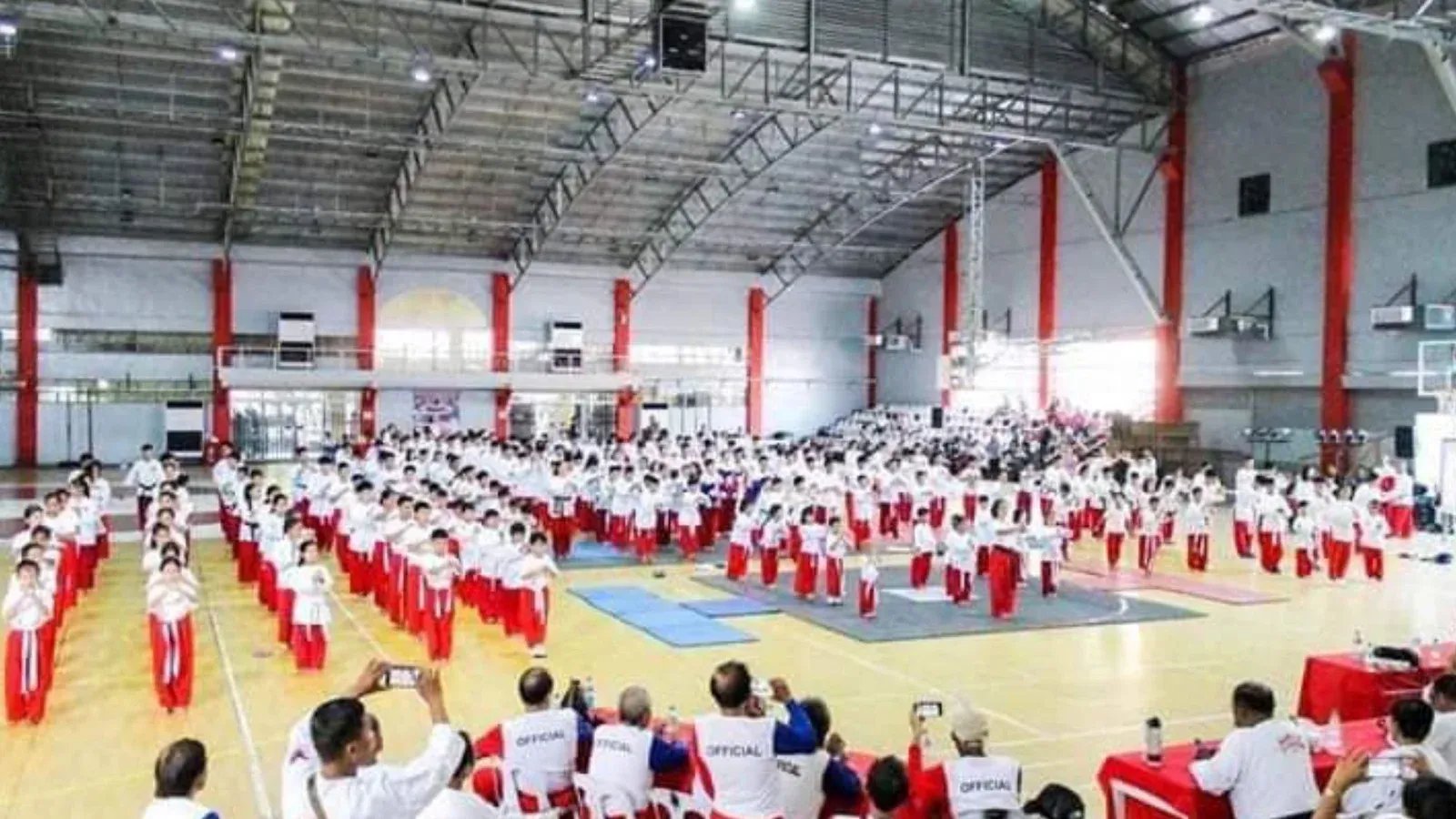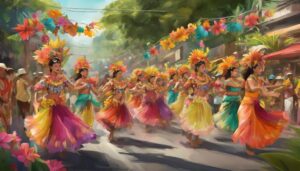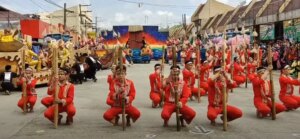
Tanay Sikaran Festival Philippines
Image Source: World Sikaran Brotherhood of the Philippines Facebook Page
Embark on a cultural journey to the heart of Baras, Rizal and immerse yourself in the rich tradition of Filipino martial arts at the annual Tanay Sikaran Festival.
This vibrant celebration showcases the Tanay Sikaran Kick, a unique form of self-defense that has been preserved and passed down through generations.
Witness local warriors demonstrate their prowess in traditional sports and participate in a thrilling martial arts tournament that highlights the skill and agility of the participants.
This festival is not only a display of physical strength but also a testament to the cultural preservation of Filipino heritage.
Facts About Tanay Sikaran Festival Philippines
| Facts | Explanation |
|---|---|
| Name of the Festival | Tanay Sikaran Festival |
| Type of Festival | Cultural and Martial Arts Festival |
| Festival Etymology | “Sikaran” is derived from the Filipino word “sikad,” meaning “to kick.” |
| Brief History of the Festival | The Tanay Sikaran Festival celebrates the art of Sikaran, a traditional Filipino martial art that focuses on powerful kicks. It aims to preserve and promote this cultural heritage through exhibitions, competitions, and demonstrations. The festival also serves as a platform for local artisans to showcase their crafts and traditional products. |
| Brief History of the City | Tanay, located in the province of Rizal, Philippines, has a rich history dating back to pre-colonial times. It was once a thriving settlement for the indigenous Tagalog people and later became a center for Spanish colonial administration. Today, it is known for its natural beauty, historical sites, and vibrant cultural traditions. |
| Location of the City | Tanay is situated in the province of Rizal, which is part of the Calabarzon region in the Philippines. |
| How to Reach the City | – From Manila, the capital of the Philippines, Tanay can be reached by road via various transportation options such as buses, vans, and private vehicles. – The city is approximately 2-3 hours away from Manila, depending on traffic conditions. |
| Nearby Cities/Towns | – Antipolo City: Approximately 30 km northwest of Tanay – Morong: Approximately 15 km southeast of Tanay – Pililla: Approximately 20 km southwest of Tanay |
| Google Map Link | Tanay, Rizal, Philippines |
| Ethnic Information | The area around Tanay is home to various indigenous communities, including the Tagalog people, who have preserved their cultural traditions and practices. |
| Festival Main Events/Activities | – Sikaran demonstrations and competitions – Cultural performances showcasing traditional music and dance – Artisanal crafts exhibition – Traditional food and beverage stalls – Workshops on traditional martial arts and crafts |
| Famous Tourist Attractions | – Daranak Falls – Calinawan Cave – Regina Rosarii Institute for Contemplation in Asia – Tanay Adventure Camp |
| Famous Food Dishes | – Sinaing na Tulingan (Braised Tuna) – Pakô Salad (Fiddlehead Fern Salad) – Kilawing Tanigue (Spanish Mackerel Ceviche) |
| Landmarks | – Tanay Church (San Ildefonso de Toledo Parish Church) – Tanay Park – Tanay Municipal Hall |
| Related Festivals | – Pahiyas Festival in Lucban, Quezon – Moriones Festival in Marinduque – Ati-Atihan Festival in Aklan |
The Origin and Evolution of Sikaran
By tracing its roots back to the ancient Filipino martial arts, Sikaran has a rich and diverse history. The word “Sikaran” comes from the Filipino verb “sikad,” which means to kick.
This fighting art has evolved over centuries and has become an integral part of Filipino culture and tradition. The Tanay Sikaran Festival in Baras, Rizal is a celebration of this unique martial art and a testament to its enduring legacy.
Historical Background in Baras, Rizal
Baras, Rizal, is known for its deep historical connection to Sikaran. The town has been a hub for traditional sports and martial arts, and Sikaran has been a prominent part of its cultural heritage for generations.
Local warriors in Baras have kept the art of Sikaran alive, passing down the techniques and skills from one generation to the next.
The Tanay Sikaran Festival in Baras, Rizal is a platform for preserving and promoting the historical significance of Sikaran in the region.
The Art of the Sikaran Kick
The Sikaran kick is a powerful and effective martial arts technique that forms the core of the Sikaran fighting style. Known for its swift and forceful kicks, Sikaran emphasizes the use of the lower body for both offensive and defensive maneuvers.
The art of Sikaran kick requires rigorous training and discipline, culminating in a display of prowess and agility.
It is a skill that not only showcases strength and agility but also embodies the Filipino spirit of resilience and determination.
Sikaran Festival: A Celebration of Local Warriors
Obviously, the Tanay Sikaran Festival is a grand celebration of the Filipino martial arts, particularly the traditional art of Sikaran Kick, in the picturesque town of Baras, Rizal.
This festival is a demonstration of the Filipino spirit, strength, and resilience – a celebration of the local warriors and their rich cultural heritage.
The festival also includes a variety of events and activities that honor the traditional sports and martial arts of the region.
The Annual Event in Baras
The Tanay Sikaran Festival is an annual event held in the municipality of Baras, Rizal, to showcase the local talent and preserve the traditional Filipino martial arts.
It brings together the community to celebrate the rich cultural heritage of the region, providing a platform for local warriors to demonstrate their skills and traditions.
The festival is a testament to the resilience and strength of the Filipino people, and it serves as a reminder of the importance of preserving and passing on these traditions to future generations.
Traditional Sports and Martial Arts Tournaments
One of the highlights of the Tanay Sikaran Festival is the traditional sports and martial arts tournaments, where local warriors showcase their skills and compete in various disciplines.
These tournaments not only demonstrate the physical prowess and agility of the participants but also highlight the significance of these traditional arts in Filipino culture.
The intense competitions and displays of skill are a testament to the dedication and passion of the local warriors, emphasizing the importance of preserving these ancient traditions.
Cultural Preservation Through Sikaran
Now, let’s talk about how Sikaran plays a significant role in the cultural preservation of the Philippines. As a traditional Filipino martial art, Sikaran has been passed down through generations and continues to be an integral part of the country’s heritage.
The practice of Sikaran not only honors the tradition of local warriors but also serves as a means of preserving and promoting Filipino culture.
Efforts to Maintain and Revitalize Sikaran
Efforts to maintain and revitalize Sikaran have been ongoing, with individuals and organizations dedicated to preserving this traditional martial art.
Through the establishment of Sikaran schools and the organization of martial arts tournaments, there is a concerted effort to ensure that the skills and techniques of Sikaran are passed down to future generations.
These efforts not only help to keep the practice alive but also contribute to the cultural legacy of the Philippines.
Moreover, the promotion of Sikaran as a competitive sport has helped to attract young practitioners, ensuring that the art form remains relevant and vibrant.
Sikaran as a Symbol of Filipino Heritage
Sikaran is not just a martial art; it is also a symbol of Filipino heritage and identity. The practice of Sikaran embodies the resilience, strength, and discipline of the Filipino people.
The art form reflects the historic struggles and triumphs of the Philippines, making it a powerful cultural symbol.
By embracing Sikaran, you are not only learning a martial art but also connecting with a rich and diverse heritage that is deeply rooted in the Filipino experience.
Summary Of Tanay Sikaran Festival
| Fact Category | Details | Links | Related Entities |
|---|---|---|---|
| Festival Name | Tanay Sikaran Festival | Tanay Municipal Website | Sikaran, Martial Arts |
| Location | Tanay, Rizal, Philippines | Tanay Tourism | Rizal Province, Luzon |
| Date | Usually held in March | Festival Schedule | Philippine Festivals, Cultural Events |
| Significance | Celebrates the martial art of Sikaran, a traditional Filipino foot-fighting system | Sikaran History | Filipino Culture, Traditional Sports |
| Events | Parades, martial arts demonstrations, cultural shows, and competitions | Event Highlights | Entertainment, Competitions |
| Salient Features | Promotes the local heritage and tourism of Tanay; Involves the youth in cultural preservation | Cultural Heritage | Heritage Conservation, Tourism |
| NLP Entities | Sikaran Festival, Tanay, Martial Arts, Filipino Tradition, Competition, Cultural Preservation | About Sikaran | Anthropology, Ethnology |
| Visitor Information | Accommodations, transportation, and itineraries for tourists | Travel Guide | Travel Guides, Tourism Services |
Summary of Sikaran
| Aspect | Details |
|---|---|
| Definition | Sikaran is a traditional Filipino martial art specializing in kicking, originating from Rizal province. |
| Etymology | Derived from the root word “sikad,” meaning kick in Tagalog, Kapampangan, and Cebuano. |
| History | Originated in Baras, Rizal before the 16th century Spanish arrival in the Philippines. Traditionally passed down orally with no written history. |
| Fighting Style | Features unique kicks like the Biakid kick, targeting the side or back of the head. Classifies effectiveness into “panghilo” (paralyzing) and “pamatay” (lethal). |
| Sport | In sports, uses feet for 90% of actions—only hands for blocking. Breaking this rule in competitions leads to disqualification. |
| International Growth | Expanded globally post-1960s through international martial arts tournaments. Notable organizations include World Sikaran Arnis Brotherhood and Global Sikaran Federation. |
| Notable Figures | Melton C. Geronimo established World Sikaran Arnis Brotherhood; recognized as a Grand Master by Asian Karate Association in 1966. Hari Osias Banaag founded Global Sikaran Federation and promoted the style internationally. |
| Related Styles | Sikaran Kickboxing, Saboong Kickboxing (Australian variant). Distinct from Kali-Sikaran, a modern variant unrelated to traditional Sikaran from Rizal. |
| References | Mallari, Perry Gil S., “Filipino Foot Fighting,” FMA Pulse, September 21, 2010. |
| Further Reading | – “A Dying Art – Sikaran, Art of Philippines Foot Fighting,” Emmanuel del Espiritu Santo Querubin – Black Belt Magazine, April 1966. – “Nagsimula Ang Lahat 800 Taon Nakaraan,” Emmanuel del Espiritu Santo Querubin – Black Belt Magazine, June 1966. |
| External Links | – World Sikaran Brotherhood of the Philippines – Ad hoc Advisory Committee Traditional Sports and Games, UNESCO(TSG) – International Council of Traditional Sports and Games (ICTSG) |
Conclusion
Presently, the Sikaran Festival in Baras, Rizal, Philippines is a vibrant celebration of Filipino martial arts and traditional sports, showcasing the remarkable Sikaran kick and honoring the local warriors.
The festival’s martial arts tournament not only highlights the physical prowess of the participants but also serves as a platform for cultural preservation and appreciation.
By participating in and supporting events like the Sikaran Festival, you are contributing to the promotion and preservation of Filipino heritage and the rich tradition of martial arts in the country.
It is important to recognize the significance of these cultural events and the value they hold in keeping traditions alive and thriving for future generations to enjoy.







